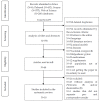Gut Microbiota Profile in Adults Undergoing Bariatric Surgery: A Systematic Review
- PMID: 36501007
- PMCID: PMC9738914
- DOI: 10.3390/nu14234979
Gut Microbiota Profile in Adults Undergoing Bariatric Surgery: A Systematic Review
Abstract
Gut microbiota (GM) after bariatric surgery (BS) has been considered as a factor associated with metabolic improvements and weight loss. In this systematic review, we evaluate changes in the GM, characterized by 16S rRNA and metagenomics techniques, in obese adults who received BS. The PubMed, Scopus, Web of Science, and LILACS databases were searched. Two independent reviewers analyzed articles published in the last ten years, using Rayyan QCRI. The initial search resulted in 1275 documents, and 18 clinical trials were included after the exclusion criteria were applied. The predominance of intestinal bacteria phyla varied among studies; however, most of them reported a greater amount of Bacteroidetes (B), Proteobacteria (P), and diversity (D) after BS. Firmicutes (F), B, and the (F/B) ratio was inconsistent, increasing or decreasing after Roux-en-Y gastric bypass (RYGB) and sleeve gastrectomy (SG) were conducted, compared to before surgery. There was a reduction in the relative proportion of F. Moreover, a higher proportion of Actinobacteria (A) was observed after RYGB was conducted. However, the same was not identified when SG procedures were applied. Genera abundance and bacteria predominance varied according to the surgical procedure, with limited data regarding the impact on phyla. The present study was approved by PROSPERO, under registration number CRD42020209509.
Keywords: bariatric surgery; gut microbiota; obesity.
Conflict of interest statement
The authors declare no conflict of interest.
References
-
- WHO World Health Statistics 2016: Monitoring Health for the SDGs 2016. [(accessed on 1 June 2021)]. Available online: https://reliefweb.int/report/world/world-health-statistics-2016-monitori....
-
- ABESO Diretrizes Brasileiras de Obesidade 2016. [(accessed on 1 March 2021)]. Available online: https://abeso.org.br/wp-content/uploads/2019/12/Diretrizes-Download-Dire....
Publication types
MeSH terms
Substances
LinkOut - more resources
Full Text Sources
Medical
Research Materials


